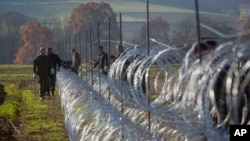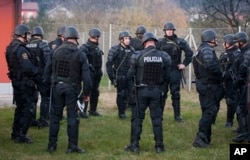European Union leaders have argued for weeks that building walls won’t solve the migration crisis roiling the continent, but on Wednesday Slovenia became the latest EU country to do just that. It barricaded part of its border in a bid to control the movement of migrants from sub-Saharan Africa and war refugees from the Middle East.
Slovenia’s move came as EU leaders opened a two-day conference in Malta to hammer out a joint plan and secure greater assistance from African countries in resolving the migration crisis.
Slovenian soldiers began uncoiling razor wire Wednesday at the border with Croatia and building a fence 2 meters high along the Sotla River. Their government's decision underlines the acrimony within the European bloc over how to cope with the most dramatic movement of people since World War II.
Moves to establish more fencing and re-impose militarization and border controls on European frontiers have raised alarm on a continent that only a few years ago boasted about its openness and the ease of travel among European states.
In addition Sweden announced that it is introducing Thursday, intially for ten days, border checks after police warned a surge in new arrivals posed a threat to public order.
Slovenia is joining countries such as Hungary, which last month sealed parts of its frontier with Serbia. Since October, an estimated 180,000 people – many from Syria and Afghanistan – have entered Slovenia from Croatia on their way north through Austria to Germany.
Not enough resources
Announcing the move before leaving for the Malta conference, Prime Minister Miro Cerar warned, "Slovenia does not have the resources to shelter large numbers of asylum seekers over the winter," if neighboring Austria shutters its border.
He said migrants would still be allowed to cross in an organized manner. But refugees voiced fear that the fencing may be a harbinger of other Slovenian restrictions and that "control" could change quickly to interdiction.
After Hungary sealed its border with Serbia last month, Slovenia found itself on the main Balkan route for the thousands of migrants landing in Greece every day after risking a perilous sea crossing from nearby Turkey.
Along with Balkan neighbors Serbia and Croatia, Slovenia is anxiously eyeing a bottleneck of refugees and migrants that has built up in recent weeks in Greece and Macedonia. Serbian and Croatian officials say as many as 50,000 may be heading their way in the next few days.
Focus of Malta talks
The Malta conference isn't going to solve the immediate dilemma, officials say.
EU leaders are offering their African counterparts substantial funds to help them tackle the root causes of migration, such as poverty and insecurity, and to persuade African countries to take back more failed asylum seekers. The European Commission has earmarked $1.8 billion in development funds and expects individual member states to match the pledge – something some European diplomats say is unlikely.
Even if the plan works, it will only do so in the long term. It won’t dissuade Syrians, Afghans and Iraqis headed for Europe to escape conflict raging in their countries.
Demographic challenges
Writing in London's Daily Telegraph Wednesday, former British foreign minister William Hague called for strengthening the EU’s external borders, "otherwise one country after another will close its own borders, not for a few days at a time, but permanently."
That would wreck the so-called Schengen Agreement, which allows visa-free travel among 26 of the 28 EU countries.
Hague said that, with a pending population explosion in Africa and Asia, "what we have seen in recent months is only a hint of what might happen next – mere gusts of wind before the approach of a hurricane."
Slovenia’s establishment of a fence with Croatia is worrisome, a senior adviser to the European Commission told VOA on condition of anonymity. "Slovenia officials may say the fence is just to coordinate the flow of refugees, but the unrolling of razor wire and deployment of soldiers along yet another border is all symbolic and is embittering internal EU relations," he said.
The adviser added: "The history of Europe has been tied up with what happens on borders and how they are policed. What controls are imposed has often signaled momentous and far-reaching political changes."
He cited the scrapping of Hungarian border controls on the frontier with Austria in May 1989 that foreshadowed the end of Soviet domination of Central and Eastern Europe.
Assessing borders
In the past few months, as the migration crisis has buffeted Europe, EU and non-EU countries alike have started to review their borders.
Germany and Austria have re-imposed some controls to curb the flow of migrants. Besides Hungary and Slovenia, four other countries – Bulgaria, Greece, Macedonia and Turkey – have thrown up razor-wire fences.
Risk is increasing that more fences will go up, with EU countries still unable to agree on a quota system for resettling refugees, and refugees and economic migrants alike seeking the easiest points of entry to reach the country they want to call home.
EU officials say interdicting refugees merely redirects the flows of asylum seekers.
Slovenia’s unrolling of razor-wire fencing prompted sharp criticism Wednesday from a leading Italian politician.
Laura Boldrini, president of the Chamber of Deputies, said "defensive measures" are not needed. She warned that Eastern European countries – which survived Soviet repression that generated their own waves of refugees – would fail to solve the continent's current immigration crisis "with barbed wire and walls."











